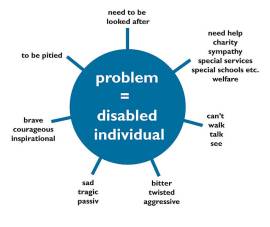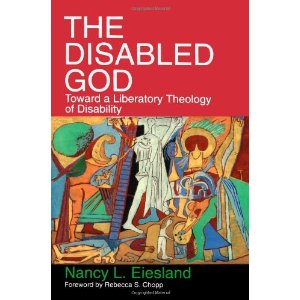I have shared, posted about, blogged on and advocated for the proposition that “disability ministry” must not be seen as “optional equipment” on the “vehicle” of the church, but that it is essential to the church BEING (and becoming) the Church.
I want to take some time to develop an argument that, I believe, leads to an interesting  conclusion: a vision of a church that includes no disabled people… a church without disability. But you’re going to have to bear with me…
conclusion: a vision of a church that includes no disabled people… a church without disability. But you’re going to have to bear with me…
Here’s my first point: 1) Disability is NOT something that is inherent in the bodies or brains of individuals (that are damaged, incomplete, inferior)
It is, of course, true that many people are confronted with chronic illnesses, impairments that give rise to conditions that can and do pose real and significant difficulties, even suffering. Actually, that’s probably true of MOST of us, at least at certain points in our lives. But, these are NOT the real, core problems of “disability.” Traditionally, most of us have been raised to understand disability as being caused (if not defined) by impairment: physical, sensory, or mental. It is, obviously, the individual who is impaired – that’s the meaning of a term like “a handicapped person”. And, thus, it is the individual who presents the problem with which we are confronted and with which we choose to deal (or not).
 This gives understanding gives rise to the “medicalization” (if not the “pathologicalization”) of disability: the impairment becomes the focus of a professionalized, specialized effort to document, understand and “cure” the impairment or, failing that, find ways to alleviate the impact or effect of the impairment. At its starkest, this approach tends towards the “institutional bias,” the colloquial expression of which is “there are places for people like that.”
This gives understanding gives rise to the “medicalization” (if not the “pathologicalization”) of disability: the impairment becomes the focus of a professionalized, specialized effort to document, understand and “cure” the impairment or, failing that, find ways to alleviate the impact or effect of the impairment. At its starkest, this approach tends towards the “institutional bias,” the colloquial expression of which is “there are places for people like that.”
Why do I dislike terms like “handicapped person” or even referring to someone as a “disabled person”… let alone referring to someone as “a cripple” or “wheelchair-bound” or a “retarded person”? It is certainly not out of adherence to “political correctness” (which, I confess, still remains a very puzzling concept to me). It is because it assumes that there is something wrong with the person which, in essence, defines who and/or they are. Yes, I know people who use wheelchairs. Yes, I have friends who have Down Syndrome or autism. These people do deal with particular conditions or impairments. Period. But there is a sense in which we are primed to see the “disability” as a direct result of, if not identical to, these impairments. I don’t buy that.
In my third point, I’ll bring up an alternative view… but, for now, I wanted to point out and challenge a common assumption – that “disability” is something that inheres within individual persons and is connected with impairments that are best understood and dealt with medically.
 Disability is not an individual issue to be addressed medically. This understanding pushes people with disabilities into the passive role of patients. It pre-defines for these people their “needs,” which revolve around their “deficits” and empowers specialists to make the important decision regarding how those needs are “best addressed.” Spend some time talking to those with disabilities who are activists: you will learn, first of all, that they don’t want to be “made better” or “cured.” The want to be accepted as “normal people,” however “unusual” their form of embodiment.
Disability is not an individual issue to be addressed medically. This understanding pushes people with disabilities into the passive role of patients. It pre-defines for these people their “needs,” which revolve around their “deficits” and empowers specialists to make the important decision regarding how those needs are “best addressed.” Spend some time talking to those with disabilities who are activists: you will learn, first of all, that they don’t want to be “made better” or “cured.” The want to be accepted as “normal people,” however “unusual” their form of embodiment.
 This viewpoint is closely related to the “charity” model – the idea that people with disabilities are “victims” of their impairment. Again, disability is seen as a deficit within the embodied individual. Because these “defective” people are “unable to help themselves” they are seen as tragic, suffering objects of our pity. This, again, is hugely disempowering, and, when internalized, will be extremely corrosive of the person’s sense of self-worth. This happens even within the church: As Nancy Eiesland writes, “Rather than being a structure for empowerment, the church has more often supported the societal structures and attitudes that have treated people with disabilities as objects of pity and paternalism.”
This viewpoint is closely related to the “charity” model – the idea that people with disabilities are “victims” of their impairment. Again, disability is seen as a deficit within the embodied individual. Because these “defective” people are “unable to help themselves” they are seen as tragic, suffering objects of our pity. This, again, is hugely disempowering, and, when internalized, will be extremely corrosive of the person’s sense of self-worth. This happens even within the church: As Nancy Eiesland writes, “Rather than being a structure for empowerment, the church has more often supported the societal structures and attitudes that have treated people with disabilities as objects of pity and paternalism.”
In our next post, we’ll begin to build a more positive understanding of what “disability” actually is. But, knowing the way most of us have been raised (both those with and without disabilities), I wanted to be clear that the first element in engaging this issue involves a bit of “deconstruction.”
Disability is NOT a matter of “something being wrong” with certain people.
This post is the first in a series that continues here.
I like where you’re going with this, Jim! Good to connect.
More coming soon… Just gotta keep ahead of this snowstorm. Nice to connect with you as well, Mitch!
Reblogged this on Mill Pond Porch and commented:
Many fascinating conversations at the Beyond Suffering conference in Ukraine keep bringing this series to mind. We’d love to hear your thoughts on this.